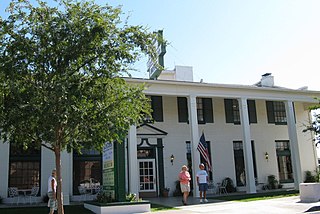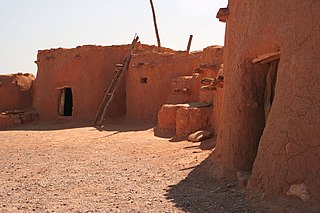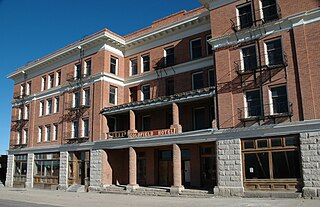
Hoover Dam is a concrete arch-gravity dam in the Black Canyon of the Colorado River, on the border between the U.S. states of Nevada and Arizona. Constructed between 1931 and 1936, during the Great Depression, it was dedicated on September 30, 1935, by President Franklin D. Roosevelt. Its construction was the result of a massive effort involving thousands of workers, and cost over 100 lives. In bills passed by Congress during its construction, it was referred to as the Hoover Dam, after President Herbert Hoover, but was named Boulder Dam by the Roosevelt administration. In 1947, the name Hoover Dam was restored by Congress.

The Herbert Hoover National Historic Site is a unit of the National Park System in West Branch, Iowa, United States. The buildings and grounds are managed by the National Park Service to commemorate the life of Herbert Hoover, the 31st president of the United States. The park was established in 1965, shortly after it was named a National Historic Landmark. It now encompasses 186.8 acres (75.6 ha).

Boulder City is a city in Clark County, Nevada, United States. It is approximately 26 miles (42 km) southeast of Las Vegas. As of the 2020 census, the population of Boulder City was 14,885. The city took its name from Boulder Canyon. Boulder City is one of only two places in Nevada that prohibits gambling, the other being the town of Panaca.
Lake Mead National Recreation Area is a U.S. national recreation area in Southeastern Nevada and Northwestern Arizona. Operated by the National Park Service, Lake Mead NRA follows the Colorado River corridor from the westernmost boundary of Grand Canyon National Park to just north of the cities of Laughlin, Nevada and Bullhead City, Arizona. It includes all of the eponymous Lake Mead as well as the smaller Lake Mohave – reservoirs on the river created by Hoover Dam and Davis Dam, respectively – and the surrounding desert terrain and wilderness.

The Las Vegas Valley is a major metropolitan area in the southern part of the U.S. state of Nevada, and the second largest in the Southwestern United States. The state's largest urban agglomeration, the Las Vegas Metropolitan Statistical Area is coextensive since 2003 with Clark County, Nevada. The Valley is largely defined by the Las Vegas Valley landform, a 600 sq mi (1,600 km2) basin area surrounded by mountains to the north, south, east and west of the metropolitan area. The Valley is home to the three largest incorporated cities in Nevada: Las Vegas, Henderson and North Las Vegas. Eleven unincorporated towns governed by the Clark County government are part of the Las Vegas Township and constitute the largest community in the state of Nevada.

Hoover Dam Lodge is a hotel and casino near Boulder City, Nevada. It is owned and operated by Richard Craig Estey. It was previously the Gold Strike until it was largely destroyed by an accidental fire on June 16, 1998. It reopened the next year as the Hacienda and then took on its current name in January 2015.

Boulder City Hospital is an 82-bed facility, a 47-bed long-term care facility, and a 10-bed Geriatric Behavioral Medicine Center.

Pueblo Grande de Nevada,, is a complex of villages located near Overton, Nevada, and listed on the National Register of Historic Places.

The Lost City Museum, formerly known as the Boulder Dam Park Museum, is located in Overton, Nevada and is one of seven museums managed by the Nevada Division of Museums and History, an agency of the Nevada Department of Tourism and Cultural Affairs.

The Eureka is a privately owned 3 ft gauge steam locomotive based in Las Vegas, Nevada. It is one of three preserved Baldwin class 8-18 C 4-4-0 locomotives in the United States, of which it is the only operable example. It is listed on the United States National Register of Historic Places.

Hot Lake Hotel is a historic Colonial Revival hotel originally built in 1864 in Hot Lake, Union County, Oregon, United States. The hotel received its namesake from the thermal spring lakes on the property, and operated as a luxury resort and sanitorium during the turn of the century, advertising the medicinal attributes of the mineral water and drawing visitors worldwide. It is also the first known commercial building in the world to utilize geothermal energy as its primary heat source.

Boulder City Historic District, is Nevada's largest listing on the National Register of Historic Places with 514 buildings. Among the buildings, 408 constructions were built during the first 11 years. Between World War II and 1950, 66 buildings were built; the rest 40 were constructed after 1950.

The Thunderbird Lodge, also known as the Whittell Estate, is a historic 6.51-acre (2.63 ha) waterfront estate located on the east shore of Lake Tahoe, in western Washoe County, Nevada. It is now within Lake Tahoe – Nevada State Park.

The Goldfield Hotel is a historic four-story building located at the southeast corner of Crook Avenue and Columbia Avenue in Goldfield, Esmeralda County, Nevada. Designed in the Classical Revival style of architecture by Reno architects Morrill J. Curtis (1848–1921) and George E. Holesworth of the firm of Curtis and Morrill, it was built between 1907 and 1908 on the site of two earlier hotels of the same name which had burnt down. Built in a U-shape in order to ensure outside windows for each guest room, the building has its west or main facade extending 180 feet (55 m) along Columbia Street with the north wing fronting 100 feet (30 m) on Crook Avenue and the south wing fronting 100 feet (30 m) along an alleyway. The ground floor exterior facades were built of grey granite stones from Rocklin, California while the interior first floor facade and all upper story facades were built of redbrick. The top floor exterior facades were crowned with a white cornice. On March 4, 1981, it was added to the Nevada State Register of Historic Places. It is a contributing property in the Goldfield Historic District, which was added to the National Register of Historic Places on June 14, 1982.

The Hotel Blackhawk is an eleven-story brick and terra cotta building located in Downtown Davenport, Iowa, United States. It is a Marriott Autograph Collection property.
The Keene Springs Hotel is a rambling wood-frame, two-story Greek Revival-style building built in sections in 1841 by Mason Singleton Jr. in the hamlet of Keene, near Nicholasville, Kentucky in Jessamine County. He and his wife Nancy owned and operated the hotel and tavern as a resort destination for the white sulphur springs nearby. During the cholera epidemic of 1848–1849 and outbreaks in the early 1850s, residents of Lexington came to the hotel to try to escape the spread of disease in the city. The Singletons operated the hotel until 1857, when they sold it to Alfred McTyre.

The Del E. Webb Construction Company was a construction company that was founded in 1928 and developed by Del Webb. Headquartered in Phoenix, Arizona, United States, it became the Del E. Webb Corporation a publicly traded company on the New York Stock Exchange in 1960. The same year, the corporation unveiled Sun City, outside Phoenix, as the first community designed for senior citizens. Many more Sun Cities were built by the corporation in the following decades. Along with construction, the corporation was also involved in real estate and owned several hotels and casinos which were built and/or expanded by the company. The company was purchased in 2001 by Pulte Homes. Pulte Homes since merged with Centex Corp. and became PulteGroup. Del Webb continues as a brand of PulteGroup.

The Glennwanis Hotel is a historic hotel in Glennville, Georgia, Tattnall County, Georgia, built on the site of the Hughes Hotel. The hotel is located at 209-215 East Barnard Street. The old Hughes Hotel was built out of Georgia pine circa 1905 and burned in 1920. The Glennwanis was built in brick in 1926. The local Kiwanis club led the effort to get the replacement hotel built, and organized a Glennville Hotel Company with directors being local business leaders. The wife of a local doctor won a naming contest with the name "Glennwanis Hotel", a suggestion combining "Glennville" and "Kiwanis".

Hotel Rogers is a historic structure located in Beaver Dam, Wisconsin, whose construction was headed by Fred Rogers in 1927-28. The site was formerly occupied by Roedl, Jacobs and Hall, a lumber, building materials and fuel store which was razed in 1924 to build the hotel. Rogers who was then president of the Malleable Iron Range Company, built the 6 story hotel to cater to tourists and the salesmen that frequently visited the city. Additional floor space on the sixth level was added in 1931. This building was operated as a hotel by his daughter, Ann Rogers-Pfieffer until 1987.
The Meadows Casino & Hotel was the first resort hotel-casino in the Las Vegas area, opening in 1931. The Meadows was located at Fremont Street and East Charleston Boulevard near the Boulder Highway, and outside the Las Vegas city limits. Its location was designed to attract workers and tourists from the Hoover Dam. The hotel had 30 to 50 rooms. The hotel-casino operated a nightclub, featuring the Meadows Revue and the Meadow Larks band. It also had a landing strip for small airplanes.



















